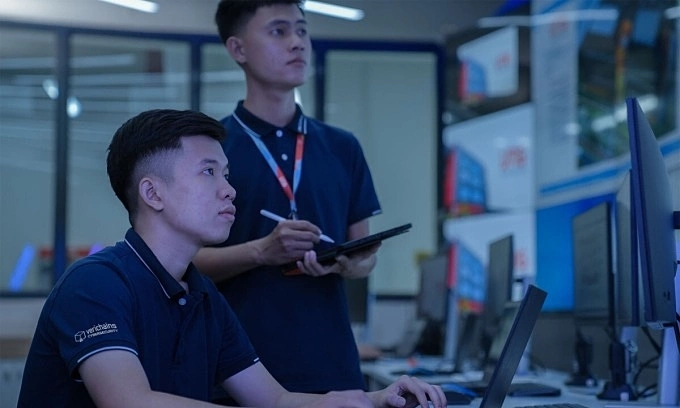Inside the world of Vietnamese crypto investigators tackling billion-dollar hacks

In February this year hackers targeted Dubai-based exchange Bybit, stealing digital assets worth an estimated $1.5 billion. Verichains quickly dispatched engineers to Dubai to assist in the investigation. Thanh says: “I felt we had to act. Otherwise, many people would be affected.”
Within a day the cause was identified. Thanh’s team produced a 28-page technical report, the first detailed explanation of the breach. It became a key reference for affected parties and users, helping reduce the spread of misinformation that could destabilize the crypto market.
“They are probably the most knowledgeable people in the world when it comes to cyberattacks,” Ben Zhou, CEO of Bybit, told VnExpress then. “I was surprised and impressed to learn they were from Vietnam.”
 |
|
Vietnamese cybersecurity firm Verichains’ engineers. Photo courtesy of Verichains |
The Bybit case is one of many major blockchain-related attacks Verichains has helped investigate. These incidents often resemble digital crime scenes, with engineers working backward to uncover what happened, much like detectives. Verichains has been involved in investigating many of the world’s most high-profile crypto breaches.
These include the 2022 theft of $600 million from BNB Chain Bridge, a platform used to transfer digital assets between blockchains, and the hack targeting Ronin Bridge, a cross-chain platform, which crippled Sky Mavis, the Vietnamese tech unicorn behind the blockchain game “Axie Infinity.”
The firm is among the few globally to provide deep-level blockchain forensics. “Our job is to investigate the root cause, identify vulnerabilities exploited by attackers, resolve the incident, collaborate with authorities across multiple countries, and support the affected organization in securing their systems,” Thanh says.
Despite its reputation for security, blockchain remains a prime target for hackers. In 2024 alone cybercriminals stole $2.2 billion in crypto assets. In the first half of 2025 alone that figure reached $2 billion, driven largely by the Bybit breach.
Thanh says blockchain technology is often wrongly blamed. In most hacking cases, the cause does not stem from core blockchain technology, but from supporting systems, non-decentralized elements such as human error, servers, wallets, and applications on phones or computers. Many crypto startups manage billions of U.S. dollars in assets but are often young companies that have scaled rapidly without the cybersecurity maturity or experience to defend against attacks.
This is where blockchain security engineers come in. They are typically brought in after a breach to audit code, trace stolen assets, identify attack methods, and recommend solutions to prevent future incidents. “When we find a vulnerability, we also check whether any other projects using the same mathematical libraries might be at risk,” Thanh says.
Thanks to a proven track record, Verichains now works primarily with major crypto exchanges and digital asset investment funds.
Rare talent in a global market
Blockchain security professionals typically fall into two categories. The first handles smart contract audits, a process that follows defined procedures. The second, more specialized group, deals with complex systems such as crypto exchanges and asset custody platforms.
Thanh says the blockchain security industry faces a global talent shortage due to its technical demands. Experts must be proficient not only in traditional cybersecurity but also in blockchain systems, cryptography, risk management, and financial operations.
While no official statistics are available, he estimates that blockchain security engineers make up only a small fraction of the global cybersecurity workforce. Market demand is also cyclical, fluctuating with crypto investment trends. When crypto prices rise, more projects are launched and security needs increase. When the market slows, demand typically declines.
However, long-term prospects remain strong. Professionals in this field often earn high incomes, especially when working directly with global financial institutions or major exchanges. “Vietnamese engineers can serve global clients,” Thanh says. “If you can prove your capabilities, clients will come.”
 |
|
Nguyen Le Thanh, founder and CEO of cybersecurity firm Verichains. Photo by VnExpress/Trong Dat |
At the GM Vietnam blockchain event held on Aug. 1 and 2 in Hanoi, Vu Ngoc Son, head of technology at the National Cybersecurity Association, said crypto exchanges now resemble banks due to the scale of assets they manage, but often operate without the regulatory safeguards of traditional financial institutions.
This creates both cybersecurity challenges and opportunities for Vietnamese engineers.Vietnamese professionals are typically patient and detail-oriented, traits essential for analyzing thousands of lines of source code to detect hidden vulnerabilities, Son said.
He added that most blockchain flaws are rooted in logic or mathematics, areas where Vietnamese talent tends to excel. “Vietnam has a real opportunity to become a global leader in blockchain security, provided we invest in the right policies and support systems.”
Vietnam’s growing role in blockchain security may soon be reinforced by new national policies.
The Digital Technology Industry Law, passed by the National Assembly in June and set to take effect in 2026, includes provisions aimed at developing digital workforce capacity.
Under the law, the government will promote education, reskilling and upskilling in digital technologies through scholarships, subsidized student loans and stipends. It also sets out a framework for investing in educational infrastructure, developing online learning platforms and promoting suitable training models to support digital transformation.




